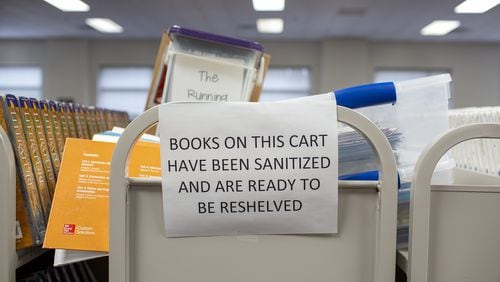Allen Fort, superintendent of the 173-student Taliaferro County Schools, said it was not a hard decision to go with online learning for the first few weeks of school, despite the low incidence of the coronavirus in his east central Georgia region.
“People may say that our COVID numbers have been only two and those were weeks ago, why are you not going back to school? Our answer is we like that number and want to keep it that way,” said Fort.
In contrast, Cherokee, Hall and Forsyth, along with many rural Georgia districts, plan to bring students back to buildings. Gwinnett, the state’s largest district and a pacesetter for other systems, was also going to hold in-person classes, but announced Monday that it, too, would go fully digital to start. That reversal — after a Gwinnett school board meeting Thursday evening devoted to defending and reaffirming the plan to reopen classrooms — could sway other districts.
“There is no replacement for face-to-face instruction, and that was our preferred model for next year,” said Gwinnett Superintendent J. Alvin Wilbanks Monday morning in a statement. “... However, out of an abundance of concern for our students, families, and employees, we made a very difficult decision based on the increasing number of COVID-19 cases we are seeing in our county, as well as the concerns that have been expressed by our teachers, parents, and others in the community.”
At last count in the metro area, Atlanta, DeKalb, Fulton, Cobb, Clayton, Marietta, Henry, Douglas, Rockdale and Decatur plan to open virtually. The Cobb and Fulton decisions to open with remote learning came within minutes of each other Thursday morning.
“I fervently believe students learn best when in front of a teacher who cares about them but, at the end of the day, our first charge is to make sure our students and staff members are safe,” said Superintendent Mike Looney of Fulton County, which has nearly 13,000 confirmed cases.
Several hours later at a Gwinnett school board meeting Thursday, parents and teachers urged the board to fall in line with Fulton and Cobb.
One Gwinnett board member agreed with them. “I would love to be in a place where we could return to in-person instruction. I don’t believe we can safely do so,” said Everton Blair, pointing out the spike in COVID-19 cases in Gwinnett and the difficulties residents face in getting tested.
Board member Steve Knudsen countered there were risks to children if Gwinnett did not resume in-person school, citing reports on rising teen suicides due to the isolation.
“If you think the only risk in our society is due to COVID, it is not true,” said Knudsen. He referenced the recent statement from the American Academy of Pediatrics supporting school reopenings for the sake of children’s social and emotional needs.
But the academy also added a caveat that’s not gotten a lot of attention — open schools if local conditions permit. A spike in cases contributed to Gwinnett’s decision to hold off on bringing students back into classrooms.
During a media briefing last week, health and education experts at Johns Hopkins University, which has taken a lead role in tracking the coronavirus and its impact, discussed what ought to be in place before that first bell sounds.
“On one hand, we recognize that the absence of in-person school has really harmed children, both from an educational and social point of view. Educationally, students learn best in class, particularly younger children,” said physician Joshua Sharfstein, vice dean for public health practice and community engagement at the Johns Hopkins Bloomberg School of Public Health. “At the same time, we’re in the midst of a pandemic that poses real risks, both to children and to the adults in schools.”
The Hopkins experts said countries that resumed schools safely first got the virus under control at the community level, which is not the case in many places in Georgia, including Gwinnett, which are seeing surges.
“We have fairly reassuring data from other countries that have gone about the work of reopening schools. … Key is they have all started from a place of having low transmission and low levels of illness in the surrounding communities,” said epidemiologist Jennifer Nuzzo, senior scholar at the Johns Hopkins Center for Health Security.
School districts in Georgia choosing to open in the next few weeks are relying on the lower rates of infection among children. But Sharfstein cautioned, “Less risk does not mean no risk.”
Anita Cicero, deputy director of the Johns Hopkins Center for Health Security, said, “Right now, we can have high confidence children experience less severe illness and deaths than adults. We can be moderately confident that children, especially younger children, are less susceptible to infection from adults. We still need more research on the transmissibility from children to adults.”
Over the weekend, a major study out of South Korea — applauded by U.S. researchers for its scope and methodology — found children between the ages of 10 and 19 are just as likely to infect others as adults.
“Even when we start back with digital/virtual/distance learning — whatever you want to call it — Aug. 5 and, with all we learned over the spring about becoming better at this, it will not replace teacher-student, face-to-face teaching and learning,” said Fort of the Taliaferro district. “However, I can make up the algebra or fourth grade reading at some point that a child did not get; I cannot ever make up for the illness or death of a child.”
About the Author







